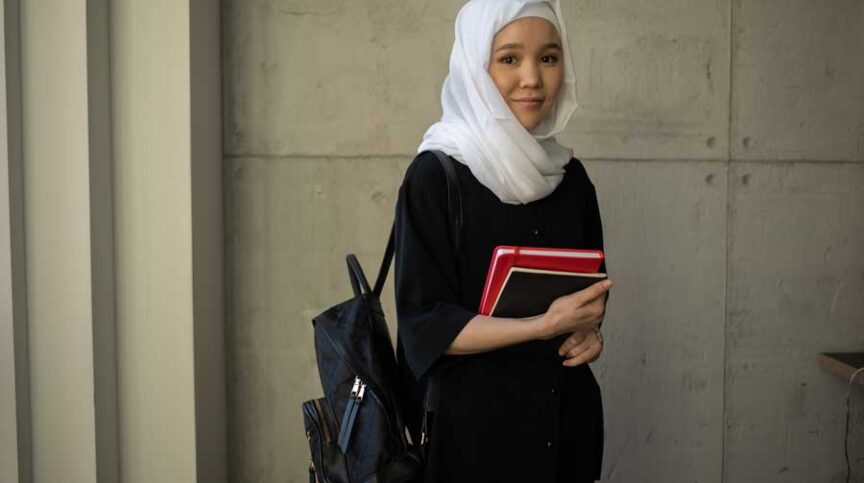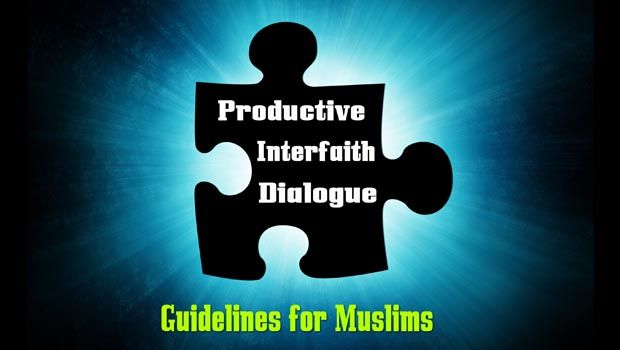Islamic faith has a strong hold on the lives of its followers. Whatever a believer does, he or she must first make sure that it is not contrary to the teachings of Islam. With acquired knowledge, a believer has to refrain from all those actions which are forbidden. This applies to matters that are universally recognized to be within the religious sphere, as well as to issues that many people would assume to be of no concern to religion. In fact, Islam is not merely a relationship between an individual and God; it is also a code of life that organizes human living in such a way as to make the pleasure of God the essential goal. The pleasure of God is achieved only by living one’s life by following God’s commands. The Quran consists of the true moral and socio-political code that has to be followed by believers to achieve their status as God’s trustees, which is a much higher status than achieved by those who live their lives to fulfill their personal needs and desires only. People who adopt obedience to divine guidance and lead a life of piety become worthy of God’s mercy and friendship. Inculcation of proper values predisposes individuals to being mature, fair-minded, and productive. Hence, they are beneficial to the society.
All Righteous Activities Are Divine Worship
Islam is the religion revealed by God, the Creator of the universe. It embodies the ideology and basic principles from which Islamic laws are derived. And human actions are to proceed from that ideology, principle, and law. Actions, whether by the individual, family, community, or state, are inseparable from faith and ideology. It is extremely important to understand that, according to Islam, there can be no split between faith and action, between ideology and law. One follows the other in the same way as cause produces effect. For this reason, action is firmly linked with faith in many verses of the Quran: “Verily man is at loss, except such as have faith, and do righteous deeds, and [join together] in the mutual teaching of truth, and of patience and constancy” (Quran 103:2-3). “But give glad tidings to those who believe and work righteousness, that their portion is gardens, beneath which rivers flow. …” (Quran 2:25). “Whoever works righteousness, man or woman, and has faith, verily, to him will We give a new life, a life that is good and pure [in this world] and We will bestow on such their reward [in the Hereafter] according to the best of their actions” (Quran 16:97).
Instead of complaining about corruption and evil in other people and society, we strive with calmness, pure intention, and utmost determination to bring about transformation — of ourselves, those in our close circles, and in the larger community.
Faith, if sincere, produces right conduct. When these two confirm each other, God’s grace transforms the life in this world. Instead of being troubled and unsatisfied, we have peace and contentment. Instead of complaining about corruption and evil in other people and society, we strive with calmness, pure intention, and utmost determination to bring about transformation — of ourselves, those in our close circles, and in the larger community. The dynamic and constructive outcomes found in living this way are visible in this life itself, but for those who actively engage in bringing about this betterment, the reward is in the hereafter, and will be beyond human expectation and comprehension. The Prophet (pbuh) said, “Allah said: ‘I have prepared for My righteous servants what no eye has seen and no ear has heard, nor has it occurred to the human heart.’” This mirrors what the Quran says, “And no soul knows what joy for them [the inhabitants of Paradise] has been kept hidden” (Quran 32:17).
Transforming One’s Character and Conduct
Islam very strongly advocates for the welfare of all the people of this world and encourages those activities that are beneficial to individuals and society. A true believer is tolerant and inclusive in his or her thinking, honest, trustworthy, and just—qualities that free human interactions from discrimination, fraud and deception, exploitation and corruption. Islamic values are intrinsic to the fitrah, the primal, innocent nature every human is born with. This is the original pure and unimpaired condition of human nature. Many individuals throughout history have not known Islam but yet followed the divinely bestowed values that produce results that are beneficial to society. This is surrender to God without knowing the formal religion as revealed to and disseminated by Muhammad (pbuh).
Corrupt people can only spread disorder and misery in society. If they occupy positions of power in government, they act in self-serving and, too often, unjust and exploitative ways.
Of course, knowing and believing in God’s final message to humanity, and acting with sincere intention to embody its principles, takes a person to a sublime realm. There all individual activities that are good and moral are acts of worshipping God. God informs us in Surah Al-Ahzab: “O you who believe! Fear Allah, and say a word directed to the right: That He may make your conduct whole and sound and forgive you your sins: he that obeys Allah and His Messenger has already attained the highest achievement” (Quran 33:70-71).
The Divine Gift: Free Will, Innate Wisdom, and Guidance
The core principles of Islam are not different from that preached by all the other prophets, some of whom God entrusted with messages through revelation. Starting with Adam and including Nuh (Noah), Ibrahim (Abraham), Ismail (Ishmael), Ishaq (Isaac), Yaqub (Jacob), Musa (Moses), Dawud (David), Zakaria (Zachariah), Yaya (John), and Isa (Jesus), the line of prophethood reached its culmination with Muhammad, the last of God’s messengers. The essential precepts of faith preached by all these messengers is the same. These principles are universal and enduring and intended for all nations and all generations. In Surah Al-Shura, God tells us: “The same religion has He established for you as that which He enjoined on Noah – that which We have sent by inspiration to you — and that which We enjoined on Abraham, Moses, and Jesus: Namely, that you should remain steadfast in religion, and make no divisions therein” (Quran 42:13).
A true believer is tolerant and inclusive in his or her thinking, honest, trustworthy, and just—qualities that free human interactions from discrimination, fraud and deception, exploitation and corruption.
God created humankind, gave it free will, a portion of innate wisdom that flows from the unimpaired conscience, and through His messengers and prophets provided guidance. God has appointed each one of us, male or female, rich or poor, as His trustee on earth to serve Him through implementing His commands in managing our affairs so as to build a just society on earth. This is a trust requiring humans to use their faculties of thinking, reasoning, caring, and conscientious volition in all aspects of life. God tells us in Surah Al-Ahzab, “We did indeed offer the trust to the heavens and the earth and the mountains; but they refused to undertake it, being afraid thereof: but man undertook it…” (Quran 33:72).
The Quran has been revealed for the guidance of all humanity. It contains the enlightenment and the instructions that facilitate our growth as human beings, aid our development of a good and sound character, and ennoble our behavior. These divine gifts – free will, wisdom arising from a healthy conscience, and the ultimate guidance – lay the foundation for establishing a prosperous and peaceful human society based on justice and mutual respect.
Motivation and Knowledge to Succeed
Life in this world is a trial so that people may demonstrate who is willing to live life to its best purpose and potential. This requires knowing one’s human duties and obligations to God, encompassing both material and spiritual aspects of life. God has provided the necessary guidance for the fulfillment of trusteeship on earth and our human worship of the Creator. This guidance has been given within the human gene in the form of conscience, and has been taught and implemented by all of God’s messengers. Conscience and prophetic example are validated and fortified by the teachings in the Quran. These teachings encompass the entire moral, economic, and socio-political areas of human activity that are required to develop and protect good character and a just and virtuous society.
To help people to achieve this high standard of nobility and continual striving for excellence (ihsan), God has sent prophets and messengers as role models to various nations throughout the ages, to preach His message and to guide people to the way of life that ensures their happiness both in the life of this world and in the life Hereafter. Although individual and collective success or failure depends on efforts, divine guidance motivates and helps people to excel in life, in learning, in character, and in their capacity to establish a good society. God provides what is required for the success of humanity, and thus, He requires God-conscious and virtuous people to be His trustees on earth.
The teachings related to refinement and transformation of human character are not like something externally pasted onto the rituals of worship. The essence of these religious and spiritual rituals cannot be separated from the individual during the movements and interactions of his or her daily life. The Islamic principles and teachings permeate the rituals, reach to the very core of human personality, infuse human affairs with meaning and purpose, save people from the thralldom of selfish or base desires, and serve as a profoundly reliable basis for all choices and decisions.
Our Choice: Trusteeship or Spreading Corruption
Corrupt people can only spread disorder and misery in society. If they occupy positions of power in government, they act in self-serving and, too often, unjust and exploitative ways. On the other hand, righteous people consider it their responsibility to institute fairness and accountability in the use of power and to enhance good governance. Those who reject the message of God and flout their arrogant ways, especially those in positions of power, risk bringing upon themselves the wrath of God. The Quran says: “[To them shall happen] the like of what happened to Pharaoh’s people and of those before them: they rejected the signs and messages of Allah, and Allah punished them for their sins. For Allah is powerful, and strict in punishment. This, because Allah will never change the blessings which He has bestowed on a people until they change what is in their souls: and verily Allah is He Who hears and knows all things” (Quran 8:52-53).
There are two conflicting tendencies within the human soul. The first tendency represents a decent and pure human nature inclined towards righteousness, which feels happiness in doing good and hates wickedness and evil. It feels remorse and sorrow on committing sin. It considers that the success of its existence is in truth and justice. The second tendency is fomented by lascivious or immoral thoughts or emotions and satanic inclinations which turn it away from righteousness. This tendency, left unchecked, leads to mean, arrogant, and/or debased behavior. It is unnecessary to try and ascertain whether these desires or inclinations enter the self from outside or whether they are ingrained within the human condition. We do know for a fact that both these tendencies are found in people. One leads to virtue and the other to depravity, and they are in an ongoing struggle for dominance in the soul.
Conscientious choice and the will to purify the self determine the final outcome of this inner struggle. In Surah Al-Shams, God says: “By the Soul, and the proportion and order given to it; and its enlightenment as to its wrong and its right — truly he succeeds that purifies it, and he fails that corrupts it” (Quran 91:7-10).
Striving in the Divine Cause
Describing his mission, the Messenger of Allah informed people that he was sent for the purpose of perfecting good morals. The transformation of people’s character is initiated by belief in God and is further facilitated through worship. Although Islamic ritual worship may vary in form and appearance, its aim and purpose is the same, which is to worship God and help people purify their hearts, build their characters, and refine their behaviors. Our prayers, fasting, charity, and Hajj (pilgrimage) are the steppingstones toward these objectives. On this path, each believer cultivates the qualities required for shouldering the trust and helping to establish just communities in which life is peaceful, secure, and prosperous.
We are challenged to strive in the divine cause, and to do so with constancy and determination. Through this striving and devotion, we can overcome our defects and shortcomings. God tells us, “Those who strive hard for Us, We will most certainly guide them in Our ways, and Allah is most surely with the doers of good” (Quran 29:69). We are further reassured of His help: “As to those who receive Guidance, He increases the [light of] Guidance, and bestows on them piety and restraint… Know, therefore, that there is no god but Allah, and ask forgiveness for your faults, and for [that of] the men and women who believe: for Allah knows your activities and your resting places” (Quran 47:17 & 19).





